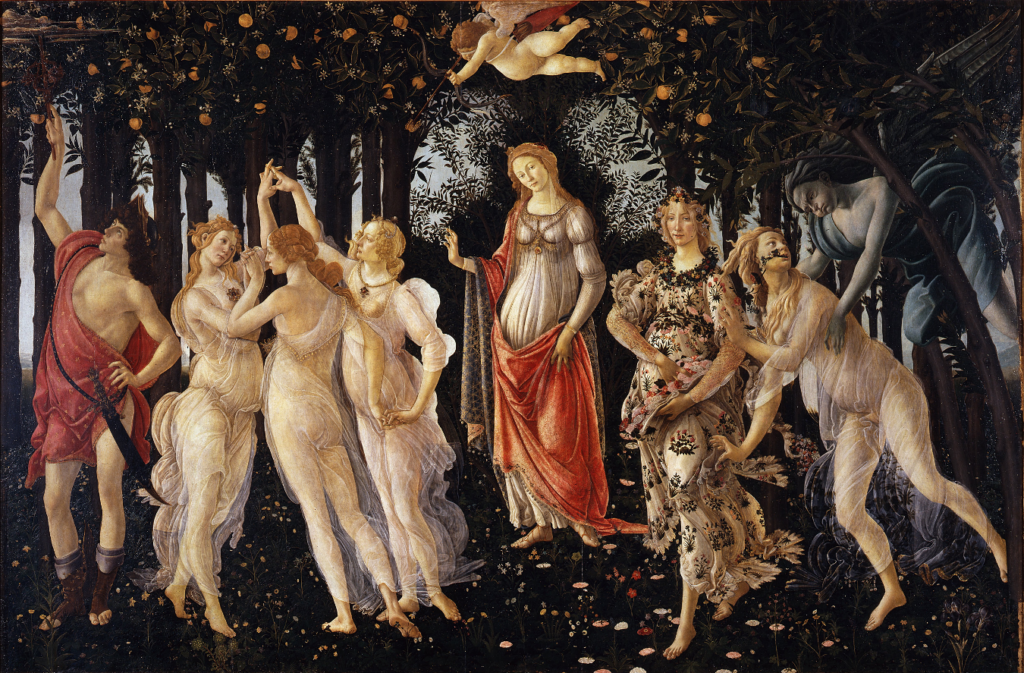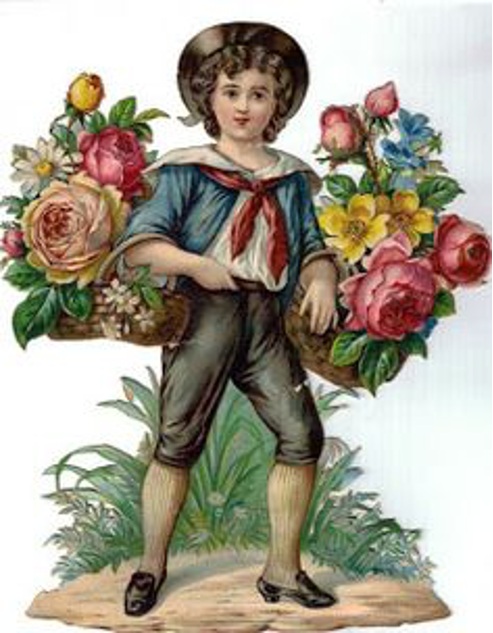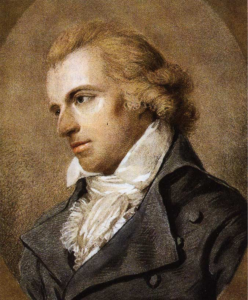To spring
(Poet's title: An den Frühling)
Set by Schubert:
D 283
[September 6, 1815]
D 338
for TTBB quartet[circa 1816]
D 587
[October 1817]
Willkommen schöner Jüngling!
Du Wonne der Natur!
Mit deinem Blumenkörbchen
Willkommen auf der Flur.
Ei, ei, du bist ja wieder,
Und bist so lieb und schön,
Und freun wir uns so herzlich,
Entgegen dir zu gehn.
Denkst auch noch an mein Mädchen?
Ei, Lieber, denke doch!
Dort liebte mich das Mädchen,
Und’s Mädchen liebt mich noch!
Fürs Mädchen manches Blümchen
Erbat ich mir von dir –
Ich komm und bitte wieder –
Und du? Du gibst es mir.
Willkommen schöner Jüngling!
Du Wonne der Natur!
Mit deinem Blumenkörbchen
Willkommen auf der Flur.
Welcome, beautiful youth!
You delight of nature!
With your little basket of flowers,
Welcome to the meadows!
Well, well! You are back again!
And you are so lovely and beautiful!
And we take such a hearty delight
In going out to meet you.
Do you still think of my girl?
Well, dear, think about her now!
Over there is where my girl loved me
And the girl loves me still!
Many a flower for my girl
I requested from you –
I am coming and asking again,
And you? Will you give them to me?
Welcome, beautiful youth!
You delight of nature!
With your little basket of flowers,
Welcome to the meadows.
All translations into English that appear on this website, unless otherwise stated, are by Malcolm Wren. You are free to use them on condition that you acknowledge Malcolm Wren as the translator and schubertsong.uk as the source. Unless otherwise stated, the comments and essays that appear after the texts and translations are by Malcolm Wren and are © Copyright.
☙
Themes and images in this text:
Spring is one of only two seasons that seem to ‘arrive’ in northern and central Europe. Summer ’emerges’ in a process of transition, and achieves its ‘mellow fruitfulness’ in autumn. Although the cold winds and dark nights that appear then are experienced as ‘arrivals’ they are outriders of the approaching winter rather than belonging to autumn itself. In classical mythology the sense of the ‘arrival’ of Spring was associated with the return of Persephone / Proserpina from the underworld, where she had been held hostage by Hades / Pluto.
In Schiller’s text, spring is a beautiful young man rather than a fertility goddess like Persephone or the figure of Flora, who is so central to Botticelli’s famous ‘Primavera’ (spring). This may be because the German word for spring, der Frühling, is a masculine noun (unlike the Italian primavera, which is feminine). A generation after Schiller Mörike would use the same image of a young man’s arrival to celebrate the fresh flowers of springtime in a poem entitled Er ist’s! (It’s him!):
Frühling läßt sein blaues Band
Wieder flattern durch die Lüfte;
Süße, wohlbekannte Düfte
Streifen ahnungsvoll das Land.
Veilchen träumen schon,
Wollen balde kommen.
Horch, von fern ein leiser Harfenton!
Frühling, ja du bist’s!
Dich hab ich vernommen!
Spring is causing its blue ribbon
To waft about again through the air;
Sweet, well-known scents
Are streaming through the land with a sense of anticipation.
Violets are already dreaming,
They want to come soon.
Listen, there is the gentle sound of a harp in the distance!
Spring, yes, it is you!
I have noticed you.


☙
Original Spelling An den Frühling Willkommen, schöner Jüngling! Du Wonne der Natur! Mit deinem Blumenkörbchen Willkommen auf der Flur! Ey, ey! Du bist ja wieder! Und bist so lieb und schön! Und freun wir uns so herzlich, Entgegen dir zu gehn. Denkst auch noch an mein Mädchen? Ey lieber denke doch! Dort liebte mich das Mädchen, Und's Mädchen liebt mich noch! Fürs Mädchen manches Blümchen Erbat ich mir von dir - Ich komm' und bitte wieder, Und du? - du giebst es mir? Willkommen schöner Jüngling! Du Wonne der Natur! Mit deinem Blumenkörbchen Willkommen auf der Flur.
Confirmed by Peter Rastl with Friedrich Schillers sämmtliche Werke. Zehnter Band. Enthält: Gedichte. Zweyter Theil. Wien, 1810. In Commission bey Anton Doll. [korrigierter Druck] page 100; and Gedichte von Friederich Schiller, Zweiter Theil, Zweite, verbesserte und vermehrte Auflage, Leipzig, 1805, bei Siegfried Lebrecht Crusius, pages 140-141.
First published in Anthologie auf das Jahr 1782, anonymously edited by Schiller with the fake publishing information “Gedrukt in der Buchdrukerei zu Tobolsko”, actually published by Johann Benedict Metzler in Stuttgart, pages 123-124. This poem has “M.” as the author’s name.
To see an early edition of the text, go to page 100 [106 von 310] here: http://digital.onb.ac.at/OnbViewer/viewer.faces?doc=ABO_%2BZ207858305


